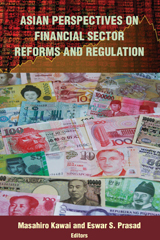Eswar S. Prasad
Nandlal P. Tolani Senior Professor of Trade Policy
 Asian Perspectives On Financial Sector Reforms And Regulation
Asian Perspectives On Financial Sector Reforms And RegulationAlthough emerging economies as a group performed well during the global recession, weathering the recession better than advanced economies, there were sharp differences among them and across regions. The emerging economies of Asia had the most favorable outcomes, surviving the ravages of the global financial crisis with relatively modest declines in growth rates in most cases. China and India maintained strong growth during the crisis and played an important role in facilitating global economic recovery.
In this informative volume, the second in a series on emerging markets, editors Masahiro Kawai and Eswar Prasad and the contributors analyze the major domestic macroeconomic and financial policy issues that could limit the growth potential of Asian emerging markets, such as rising inflation and surging capital inflows, with the accompanying risks of asset and credit market bubbles and of rapid currency appreciation. The book examines strategies to promote financial stability, including reforms for financial market development and macroprudential supervision and regulation.
Table of Contents, Introduction
© 2020 Cornell University
Charles H. Dyson School of Applied Economics and Management